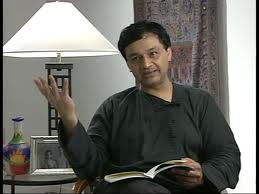Peace Watch » Editor's Take, Kashmir-Talk » Kashmir English Novelists Make A Mark
Kashmir English Novelists Make A Mark
My presentation on Shafi Ahmed’s Novel , “Beyond The Ghost Town in Hotel Grand Mumtaz
Mr. Chairman friends, Ladies and gentleman
At the outset, I must thank Shafi Ahmed, for giving me an opportunity for sharing my views on his second novel Shadows “Beyond the Ghost Town”
Driving to this place, and thinking about the book to be released, suddenly some translated verses of my favourite Palestine poet Mahmoud Dervish and our own Agha Shahid started resonating in my mind.
Pain is pain, whether of Palestine or Kashmir. In Dervish’s poetry I see my own pain, I often find echo of my pain- pain of thousands others.
It was not the colour of words we saw:
A million heroes were in the room.
This land absorbs the skins of martyrs.
This land promises wheat and stars.
Worship it!
We are its salt and its water.
We are its wound, but a wound that fights.
Sister, there are tears in my throat
and there is fire in my eyes:
I am free.”
My heart often beats in rhythm with cadence of words and phrase of Aga Shahid Ali. In the world of literature, he is my voice- voice of every one of us. Today, when a novel by another Kashmiri is being released here, I do not remember Shahid for volumes of his poetry that pop up like gushing translucent waters from the springs of Kashmir just on putting his name in any of the search engines. I remember him because he has become my mascot. He melancholically greets me from the pages of many major works of fiction, history or politics written on Kashmir during past a decade. In Shalimar the Clown – ‘a combine of wonderful fairy tale woven around the hard political realities of my land’- on opening the very first page he reminds of being ‘rowed through paradise on a river of Hell’, in books like My Kashmir- Conflict and the Prospectus of Enduring on hard politics he reminds me of my urge to ‘live for forever’:
‘I want to live forever, what else can I say?
It trains as I write this. Mad heart be brave.”
It was he who first brightened my face and renewed my hope that a poet is born amongst us, who will make the stone-hearted to listen to moans and cries emerging from ‘a country without post office’ nestled in the great Himalayas.
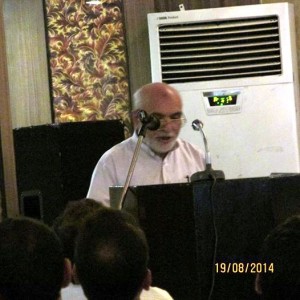 Friends: Many times, whenever I think about perpetuation of our uncertainties and apathy of world towards our agonies. I see our inability to tell the world our own story as one of important reasons for this indifference. Truth, is in our long struggle, dating back to 1865, we have not been able to produces intellectuals and ideologues like Franz Fanon and Edward Said- And in our weird literary landscape, more particularly after 1947, I did find writers that could have written as powerfully as Henri Alleg author of ‘The Question’ or could produce as powerful narratives as ‘The Gangrene’ translated into English by Robert Silvers. These books about Algeria despite being suppressed by the French government including by General Charles de Gaulle were sold in thousands and revolutionized the thinking of people in France about Algeria. Even commentaries on these books were banned. The commentary by Jean Paul Sartre on The Question after banning was circulated in thousand by people in France on their own. And ultimately these books along with other similar intellectual in puts by both Algerian and French scholars changed the mind set of French colonizers including De Gaulle and made him announce freedom for Algeria.
Friends: Many times, whenever I think about perpetuation of our uncertainties and apathy of world towards our agonies. I see our inability to tell the world our own story as one of important reasons for this indifference. Truth, is in our long struggle, dating back to 1865, we have not been able to produces intellectuals and ideologues like Franz Fanon and Edward Said- And in our weird literary landscape, more particularly after 1947, I did find writers that could have written as powerfully as Henri Alleg author of ‘The Question’ or could produce as powerful narratives as ‘The Gangrene’ translated into English by Robert Silvers. These books about Algeria despite being suppressed by the French government including by General Charles de Gaulle were sold in thousands and revolutionized the thinking of people in France about Algeria. Even commentaries on these books were banned. The commentary by Jean Paul Sartre on The Question after banning was circulated in thousand by people in France on their own. And ultimately these books along with other similar intellectual in puts by both Algerian and French scholars changed the mind set of French colonizers including De Gaulle and made him announce freedom for Algeria.
It is tragic! It is grotesque and outrageous that in our land those who stood for freedom of expression and fought for “Tahreer-u-Taqeer Kay Azadi” after 1947 tyrannically suppressed dissent and denied freedom of expression to people. But it is equally sad that our poets, writers and even historians for petty consideration fell in line with them. Some of our story tellers by contorting facts endeavoured to corrupt the very narrative of this land- for which these leaders had been jailed. Thanks to travellers and writers from outside who told stories about this salubrious land to the world. Notwithstanding, efforts made in our land to distort historical facts some classical books on birth of the Kashmir problem were written by European and American writers after 1947… Danger in Kashmir by Josef Korbel or Two Nations and Kashmir are classical examples.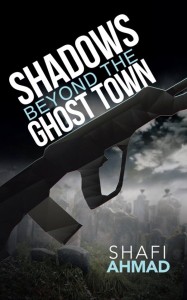
Friends, history can hardly recapture the past in its totality or reconstruct the agonized scenes or revive the echoes of sobs and moans of suffering people- that way our story has even been told by in half even well-meaning European and American writers. Memoirs and novels, ‘offer much more profound contact with the situation than the news.’ And my belief is fiction is better way to understand reality than journalism and non-fiction. Novels ‘with impressive degree of empathy and authenticity have potential to reach to a broader audience.’ The English novel writing during past couple of years by natives have generated a hope that Kashmiris will be now telling their own story to the world. And to quote Mahmood Dervish:
He who writes his story
Inherits the land of that story.
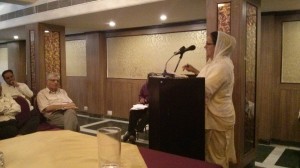 Experience teaches, it is only the natives who live through pain and agony of their people can only tell their whole stories- Let me illustrate, three novels in English were written by non-Kashmiri writers on the 1947 happenings. These included, The Scarlet Sword by H. E. Bates, Death of Hero by Mulk Raj Anand and Rage of the Vulture by Alan Moorehead. The Scarlet Sword was about happenings in Baramulla church and mission on 24-25 October, ironically, Bate never visited Kashmir and was in Kolkatta on assignment with army when he wrote this novel. Death of a Hero glorifying Maqbool Shervani role in helping Indian Army in 1947 and The Rage of Vulture is weaved around British citizen in Srinagar when Afridis were about to enter Srinagar. All the three novels written by outsiders in no way portray Kashmir and Kashmiris urges aspiration during the period but largely strengthen dominant discourse.
Experience teaches, it is only the natives who live through pain and agony of their people can only tell their whole stories- Let me illustrate, three novels in English were written by non-Kashmiri writers on the 1947 happenings. These included, The Scarlet Sword by H. E. Bates, Death of Hero by Mulk Raj Anand and Rage of the Vulture by Alan Moorehead. The Scarlet Sword was about happenings in Baramulla church and mission on 24-25 October, ironically, Bate never visited Kashmir and was in Kolkatta on assignment with army when he wrote this novel. Death of a Hero glorifying Maqbool Shervani role in helping Indian Army in 1947 and The Rage of Vulture is weaved around British citizen in Srinagar when Afridis were about to enter Srinagar. All the three novels written by outsiders in no way portray Kashmir and Kashmiris urges aspiration during the period but largely strengthen dominant discourse.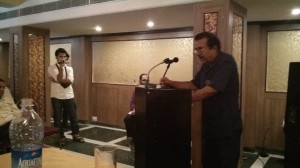
Largely there has been a lull about Kashmir after 1947, and in true sense whatever literature was produced was propagandist- the worst of all was the role played by some Bombay based “progressive writers” from 1948 up to middle of fifties. To my understanding, Shalimar the Clown published in 2005, was the first major novel that narrated Kashmir story to the world. Though the story line runs through various continents but Kashmir with all its agonies is at the heart of the novel. In dealing with the Kashmir tragedy as one of reviewers has written ‘Salman’s style is genuinely passionate; this is a paean of love to a destroyed homeland.’ After ‘Midnight’s Children’ most engaging book of the author is ‘Shalimar the Clown’. For the novel narrating the Kashmir story with real characters from Sheikh Abdullah to Saladin to Mohammad Yasin Malik and weaving them in an imaginary story- I believed Salman’s this novel could also be clubbed with new form of writing that is being described as “factual-fiction”.
The novel not only encapsulate culture and social nuances of Kashmir but very subtly brings out sufferings and tragedies of this land. The way story of Booni Koul wife of Shalimar and American Ambassador Ophuls has been woven some reviewers have rightly seen it as ‘a parable of the carelessness of American intervention on the subcontinent’. I have no idea, if new crop of novelist of Kashmir were inspired by this novel or not but I personally was motivated by a story Prophets Hair in East West to publish a collection of short stories in 1995- Tales from Solomon’s Garden – The Cindering Chinars—I was informed by friends not to write fiction as I would not able to justice to this genera of literature.
In the literary history of Kashmir 2010 and 2011 are important milestone for publication of Curfewed Night, a memoir by Bashart Peer and ‘The Collaborator’ by Mirza Waheed, first major novel in English by a native telling Kashmir story with all its pain. It caused ripples in the world of literature. So far it is first debut novel by a Kashmiri novelist that got scores of ravishing reviews world over. The novel lives true, to novelist’s belief that ‘fiction should agitate people, make them sit up and think’. It undoubtedly agitates the mind of an average reader and sets him thinking. In 2012, another novel ‘Torch Bearer: In Dark Circles’ by Ghulam Nabi Gauhar published by Raider Publishing International, New York, London and Cape Town was added to English literature on Kashmir. The 1183 page novel that captures the social, cultural and religious ethos of the land and heroic struggle of its people for freedom from oppressed rulers is a herculean task that needs “exuberant energy.” It was well received in Kashmir but hardly got any review at the international level.
The year 2014 dawned with the release of White Man in Dark by Dr. Romania Makdoomi, a young lady doctor- it is a memoir of a young medical student during nineties when entire Kashmir was soaked in blood- her experiences with boys brought to hospital with blood wounds is horrendous. Followed by two novels ‘The Half- Mother’ by young Shahnaz Bashir published by Hachette India and ‘Shadow Beyond the Ghost Town’ by Shafi Ahmad Published by Partridge India were published. Substantially, the two revolve around almost on same theme- enforced disappearances. Shahnaz Bashir’s 182 pages debut novel, with Haleema mother of Imran a teenager who suffers enforced disappearance as protagonist is in fact tale of hundreds of mothers whose children were picked up by men in uniform for questioning never to return to their homes.
Shafi Ahmed’s 302 pages novel with Ama Ganaie an upstart contractor as central character is an engaging novel that boldly tells the whole story of nineties when hundreds of youth had joined the armed struggle. Like in Dickens novel characters in Shafi Ahmed novel are from the real world- they do not grow but used as communicators for telling stories. Characters like Ama Ganaie with all their deception were galore in nineties even after and in portraying character of this contractor who has been fattening on the miseries of the people the novelist exposed weakness that have afflicted political struggle of Kashmir. Nineties threw up many vested interests like Ama Ganai, who collaborated with troops and played havoc with ecology and environment of Kashmir. To quote from the novel:
“In another few days Ama Ganaie’s band saw started running. Logs would be transported from nearby forests through army trucks to it.”
The novelist invents scenarios in which people can talk politics – and allows space to characters to discuss specific political issues. Even Mirza Waheed has also committed longer passages to his characters to enable them to talk about the political situations as obtained around. Many a macabre situations like shooting down of unarmed people that continue to torment Kashmir society find an echo in all novels or factions- as blending of fact and fiction is called.
In a story brimming with death, destruction, killing of innocents, enforced disappearance, catch and kill, brutalities of renegades, vested interests fattening on the sufferings of the peoples the novelist has very beautifully captured cultural ambiance of rural Kashmir. Shafi Ahmed as a good story teller introduces many a characters in his novel and deftly weaves a story around them. In narrating love story of a beautiful lady army officer Arti and Nazir handsome son of Ama Ganaie- who later suffers enforced disappearance the novelist very subtly exposes the grave human rights violations. Towards, the end Aarti and Ruby, Nazir visit the site of unidentified and are fortunate enough to learn about Nazir being buried in one of the unidentified grave in a remote and forsaken village.
The ‘Shadow Beyond Ghost Town’ is second English novel of the author. His earlier novel Half-Widow was recognized as commendable addition to what has come to be known as the “resistance literature” of Kashmir.
Thank you for patient hear- thank you Shafi Ahmed Once again
19-08-2014
Filed under: Editor's Take, Kashmir-Talk
